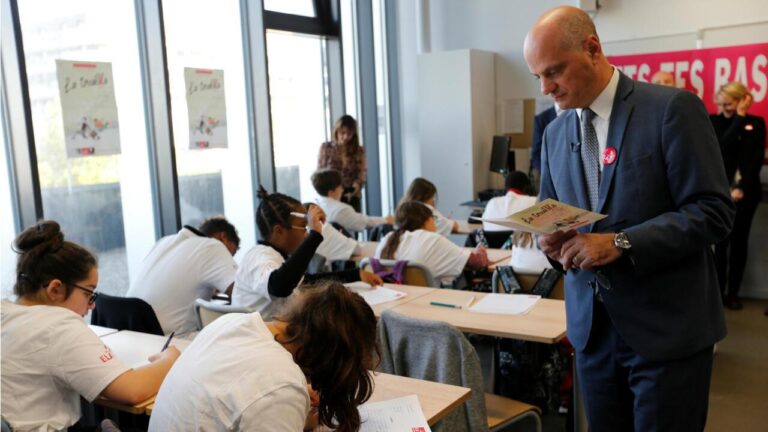Changing the Way Social Inequality in Education is Treated in France and Germany ‚Äď Sciences Po
In a groundbreaking move, leading researchers at Sciences Po are shedding new light on the persistent issue of social inequality in education across France and Germany. This initiative aims to challenge traditional approaches and propose innovative strategies to bridge the educational divide that continues to hinder equal opportunities in both countries. As policymakers and educators grapple with systemic barriers, Sciences Po’s latest findings offer a fresh perspective on how targeted reforms and cross-border collaboration could transform the landscape of educational equity in Europe’s two largest economies.
Addressing Root Causes Social Inequality in French and German Education Systems
Efforts to bridge the educational divide in France and Germany must begin with a critical assessment of systemic barriers deeply rooted in socioeconomic disparities. Both countries reveal a pattern where access to quality education is strongly correlated with family income and parental education levels, perpetuating cycles of disadvantage. Key factors include unequal resource distribution between urban and rural schools, and the early tracking systems that channel students into different academic paths based on subjective criteria, often disadvantaging those from lower socioeconomic backgrounds.
Addressing these issues demands comprehensive policy reforms, including:
- Equitable funding models that prioritize schools in underprivileged areas
- Revised student assessment mechanisms that reduce early segregation
- Enhanced support for multilingual and multicultural students
- Investment in teacher training focused on inclusive practices
| Country | Recent Reforms | Challenges Remaining |
|---|---|---|
| France | Introduction of priority education zones (ZEP) | Persistent gap between public and private schooling |
| Germany | Delayed tracking and integrated comprehensive schools | Regional disparities and migrant student support |
Innovative Policy Approaches to Bridge Educational Gaps at Sciences Po
In the face of persistent educational disparities across socio-economic backgrounds, Sciences Po is pioneering a suite of groundbreaking policy frameworks aimed at leveling the playing field in both France and Germany. By integrating data-driven methodologies with tailored social programs, these initiatives emphasize equitable access to higher education and robust support systems for underrepresented students. Collaborative partnerships between public institutions and civil society organizations have been instrumental in creating innovative mentorship schemes and adaptive learning models that directly address the root causes of educational inequality.
Critical to these efforts is a comprehensive approach that marries policy innovation with accountability. Below is a comparative overview of targeted measures implemented in France and Germany through the Sciences Po framework:
| Initiative | France | Germany |
|---|---|---|
| Access Programs | ‚ÄúCord√©es de la r√©ussite‚ÄĚ mentoring networks | ‚ÄúBegabtenf√∂rderung‚ÄĚ talent development schemes |
| Financial Aid | Targeted scholarships for low-income students | Comprehensive grants linked to academic performance |
| Curricular Innovation | Integration of socio-cultural context in pedagogy | Flexible learning paths and digital platforms |
| Evaluation Metrics | Social mobility impact assessments | Longitudinal tracking of student outcomes |
- Data transparency drives ongoing program improvements.
- Stakeholder engagement ensures policies reflect community needs.
- Cross-national research enables adaptation of best practices.
Empowering Marginalized Communities Through Targeted Support Programs
Targeted support programs have emerged as a pivotal strategy to bridge educational disparities faced by marginalized groups in France and Germany. These initiatives focus on dismantling structural barriers by providing tailored resources such as mentoring, scholarship opportunities, and language support. By addressing the unique challenges of underrepresented communities, the programs foster not only academic success but also social integration, paving the way for greater equality in education systems long characterized by deep socio-economic divides.
Key elements driving the effectiveness of these programs include:
- Community engagement: Collaborative efforts with local organizations enhance outreach and trust within marginalized groups.
- Personalized learning pathways: Catering to diverse needs boosts student motivation and retention rates.
- Early intervention: Identifying at-risk students at younger stages to prevent cumulative disadvantages.
| Program Focus | France | Germany |
|---|---|---|
| Scholarships | 45% funded by government grants | 55% private and NGO sponsored |
| Mentorship | Target urban minority youth | Focus on migrant families |
| Language Support | French literacy for immigrant kids | German language intensive courses |
Recommendations for Strengthening Cross-Border Collaboration and Reform Efforts
To effectively bridge the educational disparities prevalent across France and Germany, policymakers must focus on fostering a robust network for knowledge exchange and policy alignment. This involves establishing dedicated bi-national working groups that prioritize sharing best practices, coordinated data collection, and synchronized reform initiatives. Collaborative pilot programs tailored to regional socio-economic conditions could serve as testing grounds for innovative strategies, paving the way for scalable solutions that benefit both countries. Furthermore, integrating multilingual platforms for educators and administrators will facilitate ongoing dialogue, ensuring reforms remain adaptive and responsive to evolving challenges.
- Cross-border research partnerships: Drive evidence-based policymaking through joint studies and data-sharing protocols.
- Standardized assessment frameworks: Develop common benchmarks for measuring equality in educational outcomes.
- Professional exchange programs: Facilitate teacher and administrator rotations to disseminate best practices.
Robust monitoring frameworks are essential to track progress and identify bottlenecks within current reform efforts. Implementing a transparent evaluation system with clearly defined metrics will enable stakeholders to hold institutions accountable and encourage continuous improvements. In addition, engaging civil society organizations and marginalized communities in policy design ensures reforms are inclusive, culturally sensitive, and grounded in lived experiences. To streamline coordination, an intergovernmental secretariat could oversee deployment, reporting, and adjustment of policies across both educational landscapes.
| Key Focus | Proposed Action | Expected Impact |
|---|---|---|
| Data Sharing | Unified Education Data Portal | Enhanced transparency, informed decisions |
| Teacher Training | Binational Certification Programs | Improved instructional quality |
| Community Engagement | Inclusive Policy Workshops | Greater policy legitimacy |
Final Thoughts
As France and Germany grapple with deep-rooted social inequalities in education, new approaches pioneered by institutions like Sciences Po signal a potential shift in addressing these challenges. By combining policy innovation, cross-border collaboration, and a commitment to inclusivity, these efforts aim to reshape educational landscapes and create more equitable opportunities for all students. While the road ahead remains complex, the evolving strategies in both countries underscore a growing recognition that tackling social inequality requires not just reform, but transformation.




